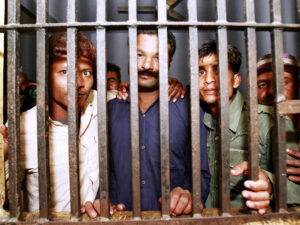 Moon Desk: At least 347 Pakistani citizens are currently imprisoned in Indian jails. 249 civilians and 98 fishermen are among them. Majority of them are persecuted in baseless cases. Similarly, 76 of them are detained in Indian jails despite completing their sentences and awaiting repatriation. The Indian government creates various obstacles for their release. For instance, sometimes under the pretense of their identity, they are kept be-hind the bars. On other occasions, Pakistan’s diplomatic personnel are accused of not providing the required coopera-tion and sometimes the jail term is extended with some other justifications.
Moon Desk: At least 347 Pakistani citizens are currently imprisoned in Indian jails. 249 civilians and 98 fishermen are among them. Majority of them are persecuted in baseless cases. Similarly, 76 of them are detained in Indian jails despite completing their sentences and awaiting repatriation. The Indian government creates various obstacles for their release. For instance, sometimes under the pretense of their identity, they are kept be-hind the bars. On other occasions, Pakistan’s diplomatic personnel are accused of not providing the required coopera-tion and sometimes the jail term is extended with some other justifications.
There is a Pakistani prisoner in the prison, despite completing his sentence in 1998. There are many such stories which echo in the corridors of Indian prisons, most of which have not been revealed yet. As per an agreement in 2008, authorities from both sides share lists of prisoners twice a year on the 1st of January and July respectively. Generally, the common people often cross the long border between Pakistan and India while grazing their cattle or by mistake, but instead of releasing them, Indian soldiers illegally imprison them while declaring them as spies.
In Indian prisons, these Pakistani prisoners are subjected to so much cruelty that either the person dies or loses their mental balance. The worst example of which was Shaukat Ali, a young resident of the border area of Sialkot, who accidentally fell into the hands of the Indian army while crossing the border and lost his life during detention. The authorities torture them to such an extent that they either go mad or are forced to commit suicide, but it is a matter of fact that higher authorities do not take any effective measure to release these prisoners. Similarly, they do not raise their voice about the brutal treatment that is made against these prisoners. In 2000, a judicial committee was formed between Pakistan and India.
The purpose of that committee was to work several times a year on the matter of prison-ers, in order to ensure their fair treatment in the prisons. It worked for eight years; however, the traditional Indian attitude came to the fore, unilaterally refusing to attend the Judicial Committee meeting in a very rude and unethical manner. If the death of Sanaullah, imprisoned in Bhalwal Jail of Occupied Kashmir, had been raised on an interna-tional level, today the condition of the Pakistanis imprisoned in India would not have been like this. The attempted suicide of prisoner Hamid Khan is enough to expose the awful face of Modi.
Therefore, it is important that the inter-national community and NGOs working for the rights of prisoners should take note of these painful incidents while standing with Hamid Khan for the sake of justice. For the sake of Human sympathy, the Indian terrorists are often released from Pakistani Jails, yet it has not brought any difference in the anti-Muslim attitude of the Indian authorities.
The majority of Pakistanis imprisoned in Indian jails are from the fishing community, who are imprisoned due to ig-norance from the rules related to the sea boundaries. However, the long-standing demand of the fishermen is the same which is in accordance with Article 73 of the United Nations; which states that fishermen cannot be arrested while fishing. But the irony is that due to strained relations between Pakistan and India, the traditional practice of deception of Hindus and lack of proper arrangements for the release of fishermen; many of the prisoners remain in jails even after completing their sentences. This inhumane treatment by India is a clear reflection of the brutal policy of the fascist Modi’s regime.







